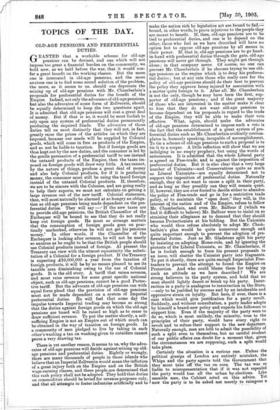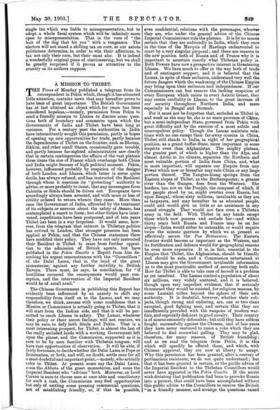TOPICS OF THE DAY.
OLD-AGE PENSIONS AND PREFERENTIAL DUTIES.
GRANTED that a workable scheme for old-age pensions can be devised, and one which will not impose too great a financial burden on the community, we hold now, as we held before the war, that it would con- fer a great. benefit on the working 'classes. But the more one is interested in old-age pensions, and the more anxious one is to find some sound solution of the problem, the more, so it seems to us, should one deprecate the mixing up of old-age pensions with Mr. Chamberlain's proposals for preferential duties for the benefit of the Empire. Indeed, not only the advocates of old-age pensions, but also the advocates of some form of Zollverein, should be equally determined to keep the two questions apart. It is admitted that old-age pensions will cost a great deal of money. But if that is so, it would be most foolish to rely upon any system of preferential duties permanently producing the required funds. The advocates of those duties tell us most distinctly that they will not, in fact, greatly raise the prices of the articles on which they are imposed, because our needs will be supplied by Colonial goods, which will come in free as products of the Empire, 8,nd so not be liable to taxation. But if foreign goods are thus kept out by the new duties, and the consumer is led by the gentle persuasion of a preferential tariff to use instead the untaxed products of the Empire, then the taxes im- posed on foreign goods will draw very little. A tax cannot, by the nature of things, produce a great deal of money and also help Colonial. products, for if it is producing money, the consumer must still be using the taxed foreign instead of the untaxed Colonial products. If, therefore, we are to be sincere with the Colonies, and are going really to help their exports, we must not calculate on getting .a large revenue out of the new tariff. Colonial statesmen, then, will most naturally be alarmed at so hungry an obliga- tion as old-age pensions being made dependent on the pre- ferential duties. They will say If the new taxes are to provide old-age pensions, the British Chancellor of the Exchequer will be bound to see that they do not really keep out foreign goods. He must so arrange matters that the consumption of foreign goods goes on prac- tically unchecked, otherwise he will not get his pensions money. In other words, if the Chancellor of the Exchequer is looking after revenue, he will not be nearly so anxious as he ought to be that the British people should use Colonial products instead of foreign. At present the Treasury can view with the utmost equanimity the substi- tution of a Colonial for a foreign product. If the Treasury is expecting £10,000,000 a year from the taxation of foreign products, it will be by no means pleased to see its taxable area diminishing owing to the use of Colonial goods. It is the old story. A tariff that raises revenue, and must raise revenue for some great specific national object, such as old-age pensions, cannot be a good Protec- tive tariff. But the advocate of old-age pensions can with equal force plead that the provision of old-age pensions must not be made dependent on a system of Imperial preferential duties. He will feel that some day the impulse towards Imperial trading may become so strong that the duties against foreign goods on which the old-age pensions are based will be raised so high as to cease to draw sufficient revenue. To put the matter shortly, a self- sufficing Empire is not an Empire out of which much can be obtained in the way of taxation on foreign goods. In a community of men pledged to live by taking in each other's washing a tax on washing given to outsiders cannot prove a very drawing tax.
There is yet another reason, it seems to us, why the advo- cates of old-age pensions will decide against mixing up old- age pensions and preferential duties. Rightly or wrongly, there are many thousands of people in these islands who believe that an Imperial Zollverem would mean the infliction of a great injury both on the Empire and on the British wage-earning classes, and these people.are determined that this rash policy shall not be adopted. They hold that duties on commodities should be levied for revenue purposes only, and that all attempts to foster industries artificially and to . . . . make the nation rich by legiSIative act are bound-to tai— bound, bound, in other words, to prove injurious to the people they are meant to benefit. then, old-age pensions are to 'be tied to preferential duties, and one is to depend on'the other, tbose who feel as we have described will have' no option but to oppose old-age pensions by all means in their power. If, that is,' old-age pensions'are to- go hind- in-hand with preferential duties through the gate, eld-age pensions will never get through. They might get thriMgh alone ; in -that' company never. Of course, --no one can prevent Mr. Chamberlain if he chooses trying:to use old- age pensions as the engine which is to drag his preferen- tial duties ; but at any rate those sib really care for the policy of old-age pensions should do their best to prevent the policy they approve being injured by association with a matter quite foreign to it. After all, Mr. Chamberlain is not the only, though he may have been the first, sup- porter of old-age pensions ; and if the great majority of .thoso who are interested in the matter make it clear to him that they do not want old-age pensions to become dependent on his proposals in regard to the trade of the Empire, they will be able to make their veto effective. What, again, should make the advocates of old-age pensions determined to impose such a veto is the fact that the establishment of a great system of pre- ferential duties such as Mr. Chamberlain evidently contem- plates is, humanly speaking, incapable of accomplishment. To tie-a scheme of old-age pensions to such a proposal is to tie it to a corpse. A little reflection will show that we are indulging in no empty prophecy, but using the words of seriousness. It is admitted that the whole Liberal party is agreed on Free-trade, and is against the imposition of preferential duties. But it is also clear that a very large number of Unionists—and Conservatives quite as much as Liberal Unionists—are equally determined not to support the imposition of preferential duties. Naturally enough, they do not want to cause a split in their party, and as long as they possibly can they will remain quiet. If, however, they are ever forced to decide either to abandon the policy of Free-trade and go in for a restrictive trade policy, or to maintain the " open door," they will, in the . interest of the nation and of the Empire, refuse to follow Mr. Chamberlain, and even Mr. Balfour if (which we find it difficult to believe) Mr. Balfour were to insist on so straining their allegiance as to demand that they shduld become Protectionists at his bidding. But the UnioniSts who would thus refuse absolutely to 'adopt Mr. Chain- berlain's plan would be quite numerous enough and quite important enough to prevent the adoption of pre- ferential duties. Just as Mr. Gladstone split his party by insisting on adopting Home-rule, and by ignoring the protests of the Liberal Unionists, so Mr. Chamberlain, if he is foolish enough to force his present proposals to an issue, will shatter the Unionist party into fragments. To put it shortly, there are quite enough Imperialist Free- traders to prevent the attempt to found - the Empire on Protection. And who could blame them for taking up such an attitude as we have described ? We are strong believers in the party system, and hold that no man should lightly desert or break up his party. Insur- rection in a party is analogous to insurrection in the State, —only to be justified by success and by an intolerable and oppressive strain on loyalty. But here, if ever, there is a case which would give justification for a party revolt Suddenly, and without consultation, a party leader adopts by himself a brand-new policy and expects his followers to support him. Even if the majority of the party were-to do so, which is most unlikely, the minority, true to the principles of their party, would have every right to revolt and to refuse their support to the new departtire. Naturally enough, men are loth to admit the possibility of such a split even to themselves, but no careful student of our public affairs can doubt for a moment that, given the circumstances we are supposing, such a split would take place.
Certainly the situation is a curious one. Unless-.the political gossips of London are entirely mistaken, the Whips and the party agents told the Government .that they must take sat the tax on corn. The tax was so liable to misrepresentation that if it was • not repealed the party would lose all the urban by-elections. Like sensible men, the Cabinet acted on this advice. Yet now the party is to be asked not merely to reimpose a single tax which was liable to misrepresentation, but to adopt a whole fiscal system which will be infinitely more open to misrepresentation. That is the cure of " the hair of the dog that bit you " with a vengeance. The electors will not stand a shilling tax on corn, so our astute politicians determine, in order to win their affections, to tax not only their corn, but their meat also. It is indeed a wonderfully original piece of electioneering, but we shall be greatly surprised if it proves as attractive to the country as its authors suppose.







































 Previous page
Previous page